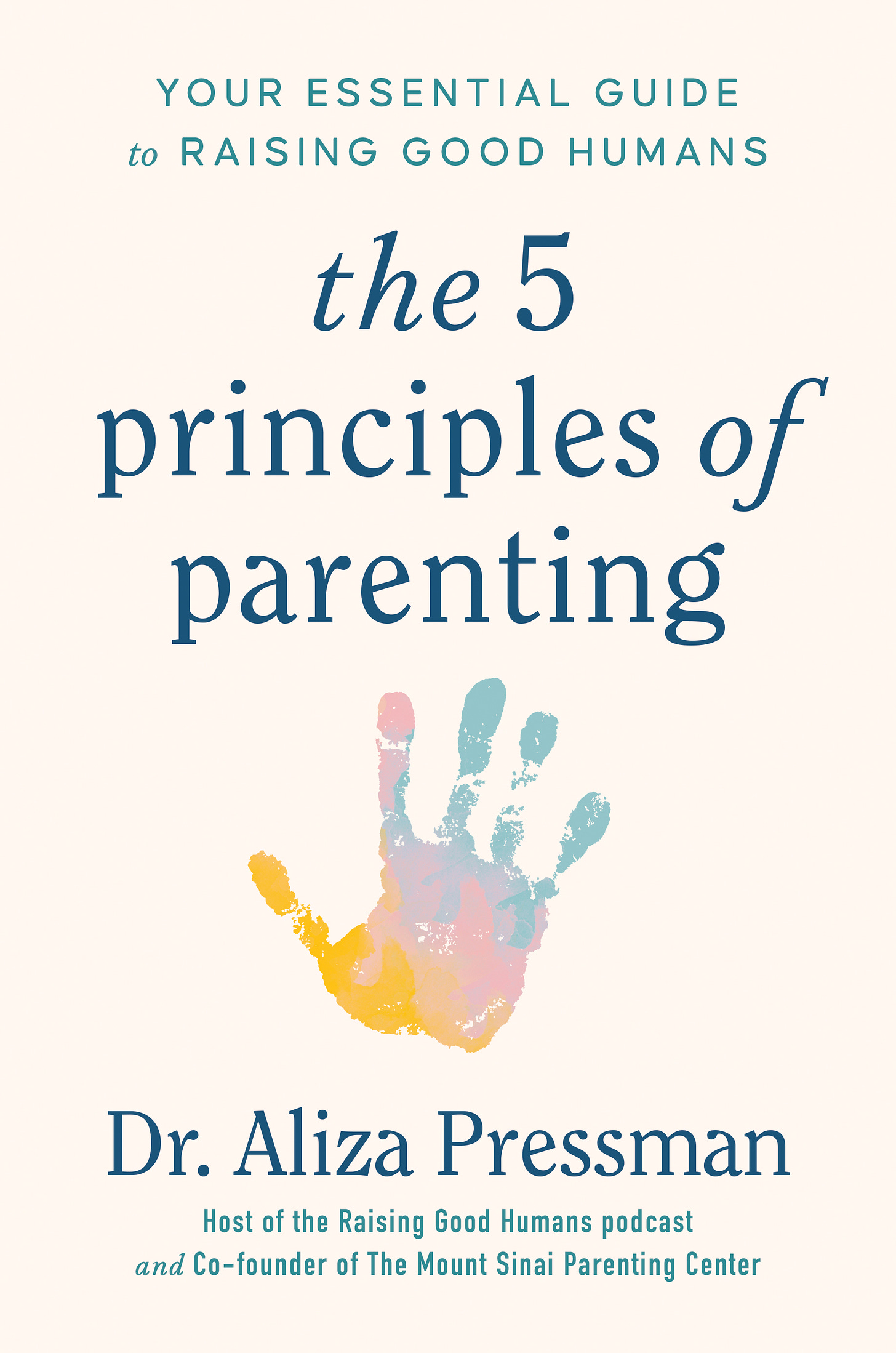Thanks for reading Raising Good Humans on Substack! My first book, The Five Principles of Parenting: Your Essential Guide to Raising Good Humans is now available for purchase here.

Who is judging your choices around work and parenting? You? Your partner? Your family or friends? For many of us, the decisions on how, when, where or if to work outside of the home are laced with insecurity and fear, thanks to generations of confusing messages about a mother’s role inside and outside her home.
This week, I took apart these ideas with Neha Ruch, author of The Power Pause: How to Plan a Career Break after Kids and Come Back Stronger Than Ever. On the latest episode of the Raising Good Humans Podcast, we are getting into all of the ways to rethink how you answer, “What do you do?” AND why we all ask it.
The transition to parenthood is a period of immense change and growth. So much so, that it represents the third biggest growth of our brain in our whole developmental trajectory. This massive shift in our physical, emotional, and cognitive being, is often accompanied by significant shifts in our professional lives. We have new purpose, new stress, and new discoveries to contend with. And that was just the first hour.
Societal expectations and outdated narratives have created unnecessary pressure and internal conflict for mothers navigating this transition for decades. We’ve been sold, shown, and taught to feel like there is one right way to mother, and told over and over that our choices are directly related to our children’s best interests. Now, in the face of new research and a new perspective, we can rewrite this time period as an opportunity to take risks, make choices, and choose freely.
As Neha discusses so well, the so-called "mommy wars" perpetuate harmful stereotypes and create false divides between parents. The historical context reveals how societal shifts and media portrayal have contributed to this narrative, often pitting "stay-at-home" parents against "working" parents. This not only creates unnecessary guilt and judgment but also overlooks the fact that parenting is a complex and multifaceted role. We aren’t either Michelle Obama OR June Cleaver (listen to the episode for this reference!)...we are both.
Firstly, it is absolutely crucial to recognize that there's no single "right" way to parent. That can never be said too much or too often. Especially from the voices of those of us who follow research and who have the true interests of parents and children at heart. Each family's circumstances and priorities are unique. Judgment from others has no place in our families. Full stop. Instead of getting caught up in comparisons, let's focus on supporting one another's choices and recognizing the inherent value in all forms of parental dedication. That starts with language. The language we use to describe our roles as parents significantly impacts our self-perception and how others perceive us. Phrases like "working mother" and "stay-at-home mom" can be limiting, and fail to capture the full scope of our experiences. As Neha explains, "Working" implies activity, while "staying" suggests stagnation. This reinforces the idea that one role is inherently more valuable or productive than the other. Anyone who has spent time with toddlers knows there is nothing stagnate about them.
Instead of relying on these labels, let's embrace the gray area and acknowledge the fluidity of our identities. In understanding the myriad of roles we all play, we must acknowledge that each one of us is "balancing it all" in different ways. By shifting our language and mindset, we can move away from rigid categories, and create space for a more nuanced understanding of the parenting experience. We need to.
Neha’s work also focuses on helping mothers to redefine success amidst new roles and non-traditional choices. While we know that the corporate world often measures success by promotions, salary increases, and titles, mothers in a new role need to rethink measures that align with values and priorities during this chapter. These goals can be professional, creative, personal, and familial, and can serve to decouple our sense of worth from external validation, and create a more fulfilling experience.
Practical Tips from the Episode:
Open and honest communication with our partners is crucial for navigating the work transition successfully. It's important to discuss financial implications, family dynamics, and individual needs and expectations. This ensures that both partners feel valued, respected, and supported.
When discussing childcare arrangements or career adjustments, approach the conversation as a joint household organization. Both partners contribute to the family's well-being, and both deserve to have their needs met. This shared responsibility fosters a sense of teamwork and strengthens the partnership.
It's important to remember that this is a chapter, not a life sentence. By viewing this time as a temporary phase, we can alleviate the pressure to make permanent decisions, and allow ourselves the freedom to evolve and adapt.
So next time you’re standing at pick-up, or at the grade-level mixer, try asking a mother about more than, “What do you do?” Start with, “How did you spend the day?” or “Did you find any balance today?” Try answering the question yourself, too. Maybe then, we can change the way we see others, and ourselves.
A quick reminder to buy my first book, The Five Principles of Parenting, and write a review from wherever you order. Reviews really help to get the book noticed, and to spread the word. Please especially rate and review any books purchased on Amazon (it shockingly really, really matters!). Also, when you receive the book, snap a quick pic with it and post on social media. Share one thing you love about it and help me to get more copies into the hands of parents in your community. Tell a friend about the book, or about something you found helpful in the book. Parents look to each other for advice, and I’d love to be a part of the support you pass on to your loved ones.






This hit home. I’ve spent years unlearning the idea that my worth is tied to how much I do—as a parent, as a business owner, as a human. The labels we put on mothers are just another way society tries to control us. “Working mom” vs. “stay-at-home mom” feels like a false choice when, in reality, most of us are doing everything, all at once, with no clear lines.
I’ve raised six kids while navigating massive life transitions, and if there’s one thing I know for sure, it’s that my identity isn’t static. Success isn’t a title. And anyone who thinks raising kids isn’t “work” has never had a toddler demand a snack while they’re in the shower.
We need more of this kind of conversation. 💛